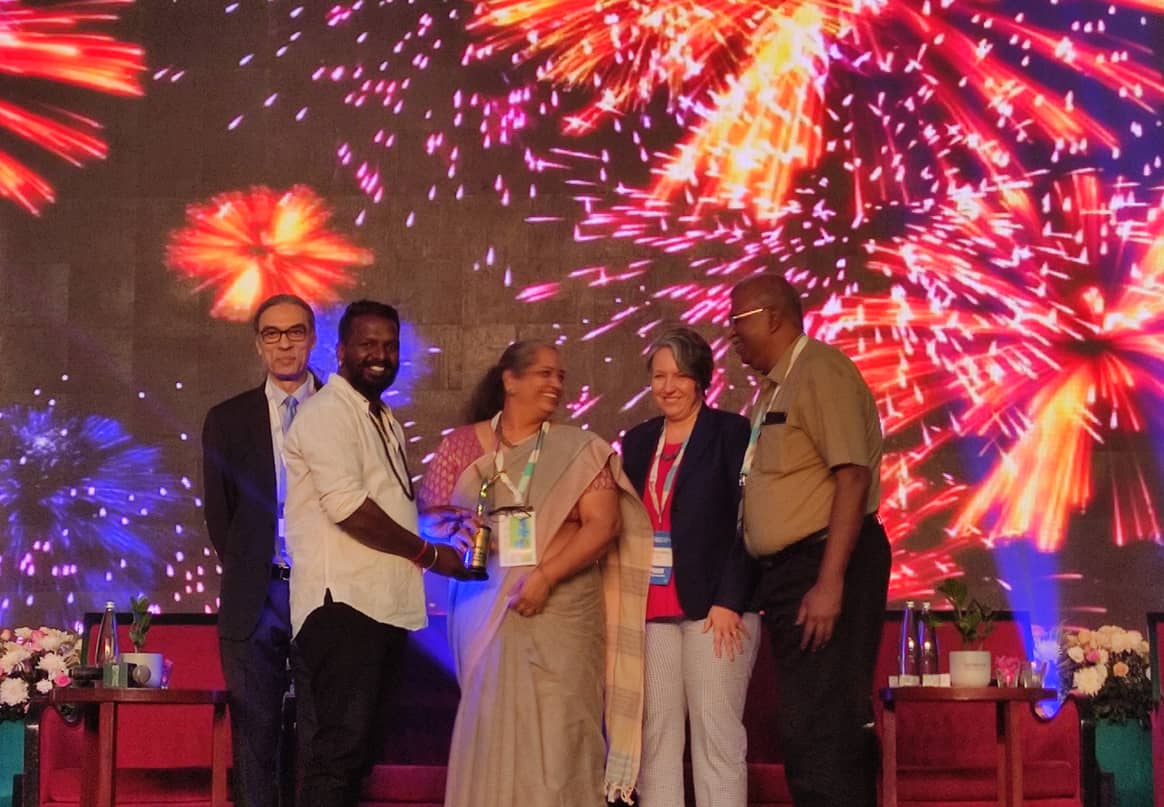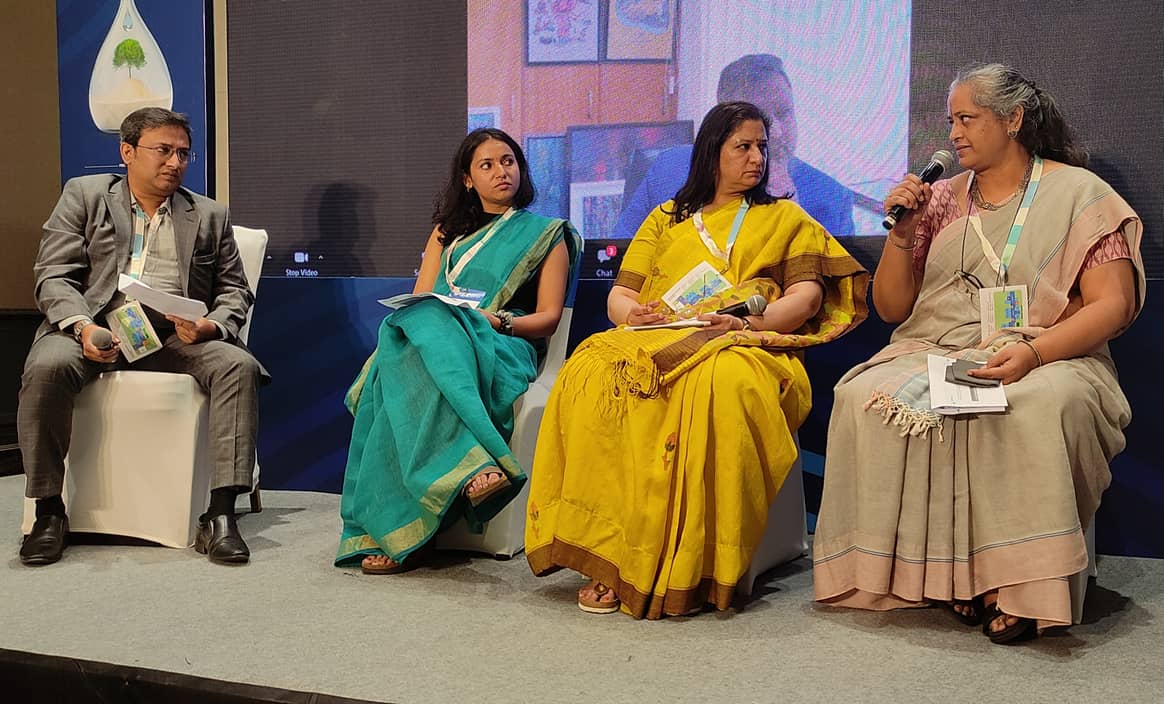Engaged in the clothing industry for 20 years.

How the industry can support a just and inclusive transition towards circular fashion
A recent panel discussion at the Sankalp Global Summit 2023 on 19th October in Mumbai looked at how a just and inclusive transition towards circular fashion is possible and how different industry stakeholders can support it.
Starting at the bottom, Mansi Kabra from non-profit labour innovation company Good Business Lab pointed out that in most current business models, a company’s labour or worker is considered a “cost”. “In this model, workers are disadvantaged. One has to show businesses that labour is not a cost but an investment. There is a direct link to business profitability, for example soft skills training for women frontline workers and their managers that leads to an improvement in return on investments,” she explained.
Empowering female workers
Nalini Shekar from Bangalore-based waste picker organisation Hasiru Dala agreed and stressed that fact that women’s empowerment is crucial. “We make a business case for investing in waste pickers who are nano-entrepreneurs,” she said, “because they also influence the right kind of ecosystem, which comes from the right kind of policies.” “Initially it was tough, to make women entrepreneurs but now 50 percent of the 84 people are now women. Their commitment is much higher and they not only create more jobs but also an ecosystem with certain rules, like no alcohol, no violence in my community.”

Kazi Faisal Bin Seraj of international development organisation The Asia Foundation mentioned the initiative “Oporajita” in this context, which means “the Undefeated” in Bangla. Together with the H&M Foundation, it not only aims at skilling female garment workers in Bangladesh but also creating jobs for out-of-work RMG workers in a circular economy.
Textiles are not waste
Coming back to Bangalore, India, Shekar revealed that most of the waste collected at Hasiru Dala is textile waste, which the organisation focuses on reusing. There are currently 39 so-called „dry waste” collection centres, which gather 30 to 200 kilograms of textile-based waste each week. [In India, waste is divided into two main categories: “wet”, which is anything biodegradable, and “dry”, which is anything that is not.] This textile waste used to go to landfills but in a new approach that partners with Mumbai-based Intellecap’s Circular Apparel Innovation Factory (CAIF), textiles are now collected separately — 100 tonnes in just a few month and saved from landfill.
It was surprising to hear that the maximum amount of textile waste comes from economically weaker communities. This is not because they buy so many textiles and garments themselves, rather they get donations from the places where they work (as maids, drivers, cooks, etc.) Their employers pass on their old clothes and they accept them, feeling they cannot say ‘no’ but ultimately, the items get thrown away.
Reducing consumption and production
Krishna A., a third generation waste picker (after his mother and grandmother) who joined the panel, agreed. He was able to make the transition to entrepreneur and has been successfully running a dry waste collection center in Bangalore for the last ten years. In that time, the centre averted about 12 to 13 tonnes of clothes from going to landfill. Krishna even developed an app to monitor people’s segregation habits and teach them how to do it. „I also partnered with students from the US for three months and we found that there are enough clothes in the system to last for seven generations,” he shared, adding “but only one percent of that gets recycled.”
Asked how to implement climate action in fashion, panelist Leena Dandekar from the Raintree Foundation pointed to responsible consumer choices as being part of the solution. “The panel is wearing handloom saris because it is sustainable,” she observed. “Durability and longevity is extremely important in a world of fast fashion that takes maybe six to eight weeks to make and ship. And that is also how long it will be worn.”

“Cleaning garments responsibly, for example with pro-biotic cleaning products, is also part of responsible consumption,” she added. “It would be best not to use Nalini’s services. Clothing should be biodegradable, fast fashion is irresponsible.”
Kabra agreed and put it in a different way: “The dream of the development sector is for it to not exist,” she said. Keeping the most impact in mind, she added that “any solution would include a bottoms-up rather than a top-down approach.”
Reduce, Reuse, Recycle
For Dandekar, it is really simple as circularity has only three pillars: Reduce, Reuse and Recycle. “Reducing should always come first. Then should come reuse and only then should something be recycled,” she cautioned.
The last question, posed to the whole panel by moderator Somatish Banerjee from Intellecap, was how to achieve a just transition of the waste picker community. “Give a voice to workers and also provide them with fair wages and safety,” was Krishna’s reply, a sentiment that was echoed by Shekar.
For Dandekar, it is all about the fact that business as a whole has to change, as well as providing education on what is a responsible lifestyle and responsible consumption. “As a funding entity, finding reliable partners who are connected to people on the ground is crucial,” said Abeer Al Fouti from Global Initiatives, Alwaleed Philanthropies. Working together is key also for Kabra: “There needs to be more collaboration between workers and management. Strengthening the workers’ voice is important,” she said. “Until that happens, we will be solving problems that don’t exist.”


